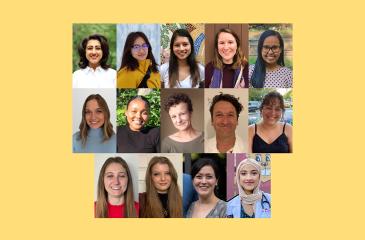The Office of Academic Clinical Affairs’ third cohort of students in the Interprofessional Internship Program includes 15 students from across the health sciences who have been accepted and matched with core projects with clinical and community partners in Minnesota. The theme of this year’s program is to work in cooperation with those who receive care, provide care, and support the delivery of health services, programs, and education.
During the course of the projects, interns learn to apply leadership practices that support equitable and effective interprofessional collaboration. They also develop and lead a monthly professional development series for their peers, and benefit from networking and mentorship opportunities.
Take a look at this year’s cohort and the projects they will be working on, which were developed in response to priorities of our partners:
Raising Awareness of Fentanyl Use and Overdose with Hope Network
Kandeija Bagurusi, BS, Medical School
Joy Schmidt, BS, School of Public Health
Interns will work with the Steve Rummler HOPE Network to raise awareness and increase understanding of fentanyl use and overdose, particularly as it pertains to Black communities, who are disproportionately impacted by the opioid epidemic.
Identifying Effective Outcome Measurement Tools with EA Therapeutic Health
Jenna Broihahn, BS, Center for Allied Health
Meghan Ford, BA, School of Public Health
Interns will use existing historical electronic health record data to create a data story demonstrating the effectiveness of the services and programs at EA Therapeutic Health, a rehabilitation and adaptive fitness facility. Utilizing existing data, they will identify and recommend effective outcome measurement tools related to the social determinants of health, readiness for change, health improvement, and quality of life. Interns will implement and evaluate the reproducibility of their data collection process in standard clinic practices.
Identifying Opportunities for High School Students in West Central Minnesota with UMN Morris Challenge
Saliha Chaudhry, BA, Medical School
Kevan O'Hanlon, BA, School of Public Health
The UMN Morris Challenge promotes sustainability, practical solutions, and community cooperation to engage communities to improve health and quality of life. Interns will support the Challenge Director in identifying opportunities for high school students in West Central Minnesota to connect with health professionals in their communities. Interns will engage with stakeholders to promote community-based planning and development.
Creating Infrastructure Support with Neighborhood HealthSource
Hodan Hachi, BS, School of Public Health
Brittany Lee, BS, College of Pharmacy
Interns will identify infrastructure support and create a model for a financially sustainable mobile clinic in the metro area. The goals of this mobile clinic are to provide preventative care to uninsured children and improve immunization rates for Latinx and African American children in Hennepin and Anoka Counties.
Advancing Student Leadership and Peer Mentorship with the Center for Interprofessional Health
Arazu Kian, BSN, School of Nursing
Elena Tran, BA, School of Public Health
The Center for Interprofessional Health co-lead intern positions promote personal leadership development in an interprofessional context; mentor incoming interns; and advance novel interprofessional initiatives in line with MPact25 priorities through cross-sector collaboration. Interns will enhance interprofessional initiatives and support quality experiences for a variety of stakeholders.
Promoting Sustainability and Accessibility Using Care Corner Network Infrastructure with the Center for Health Interprofessional Programs
Nicole Oblon, BS, School of Public Health
Chenwei Yan, BA, College of Pharmacy / School of Public Health
Interns will develop Care Corner network infrastructure to promote sustainability, accessibility, and quality of individual Care Corners and the Health Sciences Care Corner Network. The network aims to impact food insecurity among health professional students. Interns will develop community partnerships to pilot the Care Corner model in one non-profit community partner site, and explore partnerships with multiple organizations to support infrastructure of the Care Corner network both off and on campus.
Exploring Physical Therapy Profession and Practice in Bolivia with Mano a Mano
Robert Pokorney, BA, MA, School of Nursing
Tiffany Widseth, BS, Medical School - Doctor of Physical Therapy
Maddie Weirick, BS, School of Public Health
Interns will explore and analyze the physical therapy profession and practice in Bolivia. With a thorough comprehension of the discipline and context, they will develop education materials about equipment used by professionals in the setting and disseminate to stakeholders to support needs.



